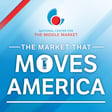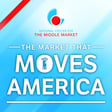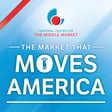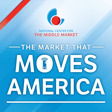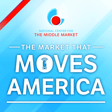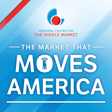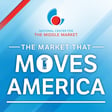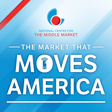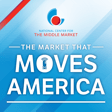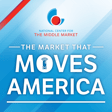Become a Creator today!Start creating today - Share your story with the world!
Start for free
00:00:00
00:00:01

Perspectives From NCMM’s First Member
Join us as we learn from a middle-market business owner and hear the story of building a mid-size organization from his basement in 1991 to today as the largest supplier of outsourced claims. CIS Group is a proud member of NCMM. Michael Stanley, the founder of CIS Group, talks with Doug Farren on his perspective of owning a mid-size company on this episode of The Market That Moves America.
CIS Group empowers insurance carriers and finance companies with superior field operations and data collection. With a track record of conducting over 55 million property inspections and claims across the United States, CIS Group presently caters to the most significant property and casualty insurance companies in the U.S.
Transcript
Introduction to the Podcast
00:00:02
Speaker
Welcome to The Market That Moves America, a podcast from the National Center for the Middle Market. The center is the leading source of knowledge, leadership and innovative research on the middle market economy. Throughout our podcast, we will feature middle market leaders and stakeholders to hear their real world perspectives on trends and emerging issues.
Meet Doug Farron
00:00:23
Speaker
Welcome to The Market That Moves America. My name is Doug Farron. I'm the managing director for the National Center for the Middle Market.
Guest Introduction: Michael Stanley
00:00:31
Speaker
And joining us on today's podcast is Michael Stanley. Michael is the founder of a midsize provider of risk management, underwriting and claims management services, and they are based in South Lake, Texas. So Michael, welcome to the podcast. Yeah. Hi, Doug.
Stanley's Career Journey
00:00:50
Speaker
So yeah, why don't we just get started? If you could just tell us a little bit about yourself, your background, and maybe some of the origin story of how and why you founded CIS group. Yeah, Doug, sure. Well, if there's anything such as unconventional and how you start a company and get it into the middle market, I was out of college and graduate school, I was teaching math and coaching football and doing what you do as a
00:01:22
Speaker
as a teacher and a coach, but I had the summers off and was still relatively young then, this is obviously a few years past, and a guy that I went to graduate school with called and said,
00:01:40
Speaker
what do you do in the summers? And I said, well, you know, I teach a class and I don't know, pill around, not much. And he said, well, do you know anything about catastrophic claims? I'd never thought, never heard of, didn't know anything about it. Said, no, tell me what it is. And so anyway, he explained it to me and said, would you like to come up and help me out for a couple of months? I was still single. And it was come out and help me. I was in Austin, Texas, not a terrible place to be when you're
00:02:09
Speaker
at that time. So I went down and worked for a bit. For a provider, it's a company that's actually still a competitor, but I was a very friendly competitor. And really liked it. Didn't know anything about the insurance business at that point. I thought my insurance agent was an insurance company. I didn't know much about it.
00:02:31
Speaker
But I got there and enjoyed it and met a couple of the principals at that company. We hit it off, Doug, and they offered me a job. And it was certainly, I was passionate about teaching and coaching, but I'd been doing both for a bit. And so I said yes, almost serendipitously. I just said yes. And so I went to work for this company.
00:02:58
Speaker
This was 1992, 1991 or 1992. I went to work and through just a series of interesting events, I wound up getting promoted a couple of times, probably before I should have, and wound up as a regional manager, regional operations manager with this company in all state out of Northbrook, Illinois, was a customer.
00:03:23
Speaker
Got to know them pretty well. They approached me, Doug, and said, hey, we're thinking about outsourcing this sort of underwriting services, some of the pricing mechanisms, things that we've done in house forever.
Entrepreneurial Leap: Founding a Company
00:03:35
Speaker
Would your company like to do it? And I was young, and the answer to them always was yes. Well, sure, we'd like to do it. And so, yeah, and the company I was working for, we stood up this division.
00:03:49
Speaker
And it was fine. It was working fine. It just wasn't core to what they did. The company I was working for said, we'd like to exit that and start doing, you know, get back to what we actually are built to do. All state approached me because I had the manager and they said, hey, have you ever thought about having your own company?
00:04:10
Speaker
So the story would be so much better if I had this great idea and started everything like, you know, I've tried to tell this story with peer groups and they're like, that's a pretty good enabling customer. Anyway, I said yes. And so that's the ad. And I said, yes. The hung out machine go very cliche, actually in the basement of our house in Chicago, where I lived at the time as the regional manager.
00:04:38
Speaker
started it working in a six-county Chicago area. Obviously, we worked hard, but a lot of good fortune, a lot of good timing
00:04:56
Speaker
that I didn't really have any, I didn't have anything to do with, but a lot of good fortune. And so I'll connect the dots. Anyway, we doing that with one customer in a six county area, we expanded over the years, some 29th mid 30th anniversary this year. We've expanded to the point that we cover tip to tip in the United States. We're the largest supplier in our market of,
00:05:24
Speaker
of combined outsourced claims, risk management services in the country. We work for Allstate and State Farm and Chubb and one of our partners on Situation Nation, one of the, most of the tier one carriers around the country.
Overcoming Early Business Challenges
00:05:42
Speaker
Wow. That's, that's an interesting, that is a very interesting story. So Allstate was the accelerant that kind of pushed you into this and then
00:05:52
Speaker
That got you started and going and you just kind of have slowly built out and grown from there. I started with one partner who's still part of the company. He's not a fiscal partner, capital partner, but he was a manager. He actually knew a little bit about what we were doing. But neither one of us had any type of sales training or background or anything.
00:06:19
Speaker
And so we were driving through Bloomington, Illinois, working for Allstate, driving through Bloomington and saw State Farm, didn't know. Well, I mean, obviously we'd seen State Farm on TV and we actually cold called the
00:06:35
Speaker
It didn't work, but it was our first journey into, can you leave us a business card? And we didn't have a business card. We didn't have anything, right? But we sort of stuck with it and got some advice on some of it and started
00:06:54
Speaker
asking the other big carriers if they did or were thinking about doing what we did. So how did you build up that, you said you got some advice, I mean how did that skill set start to build up over time? Did you just practice a lot or did you get some good leads or did success kind of lead to further success?
00:07:14
Speaker
I think C, right, that was probably the biggest part of it. We didn't start off with small, our customers are big, you know, Fortune 50, Fortune 100 companies and we didn't, we had built the product, a service, a big major carrier and the
00:07:36
Speaker
The industry was going through a fundamental shift in the way they conducted business. They were these old line, very meticulous, very buttoned up, very conservative insurance companies. We're beginning to, for the first time really in their history, we're starting to outsource field operations.
00:07:57
Speaker
They never wanted to do it. And so having a company, having a big company on your resume with some pretty good referrals, that's probably had more to do with us getting in the door. And we did some research, Doug, we found a couple of conferences. It's just what you think just at that time, probably Barnes and Noble, I'm not sure we were on the internet looking for it, but just found a couple of books about how to do it. And
00:08:25
Speaker
And I'll be darned if we called on them, started selling to them in different forms and fashions. And we did get some advice. We actually hired a sales advisor, not a full-time sales rep. He's a guy that retired, worked in big B2B shops, and he taught us a lot about how to get past the initial objections to get in the door.
00:08:51
Speaker
And then once we got there and we built some momentum when we had three or four of the big carriers on our service resume, the expansion, it sort of grew from there. Yeah.
Navigating the Risk Management Market
00:09:05
Speaker
So I wanted to talk to you a little bit about the market space that you operate in. So after 30 years, CIS group itself is a mid-market company.
00:09:17
Speaker
Yes. And so who do you compete against? I mean, what's that landscape look like? And how do you position yourself as kind of a unique provider of these different services that you mentioned? Right. You know, Doug, I've contemplated that a couple of times.
00:09:33
Speaker
We've made the sort of this, we've traversed this field from the hunter to sort of the undead. We really spend more time defending our position now than we do aggressively. I mean, we're always looking for correct opportunities for expansion, but we spend time
00:09:58
Speaker
now in a position. It's a niche market. It's not a massive market. So it's a niche market. We have very capable, really well put together competitors that I have deep respect for. It's a friendly, believe it or not, it's a pretty friendly market. The people that we compete against are, yeah, they're friendly competitors. We know each other well and
00:10:27
Speaker
not just know each other well. We divide stuff up sometimes just to help things out. So it's a pretty friendly market. All that being said, we decided
00:10:41
Speaker
About the year 2000, we had had a little bit of success, and so we stuck our toes in a couple of different service lines, thinking, well, if we can do this, how hard could that be? And we learned really valuable lessons about how hard it all was. And so around 2000, this 2001, 2002 period, when we were finishing our expansion throughout the Northeast,
00:11:08
Speaker
We just determined that we were going to focus on these core offerings that we're familiar with and we've had some success in. So instead of dabbling or tinkering with different strategies, we said, listen, let's just exploit our market. Try to get to the place where we're, at least in our minds, as good as we can be inside the box we operate in. So we really had this dedication to core functions
00:11:38
Speaker
and not dabbling in business lines or succession lines that look like they would make sense, but that become very disruptive. And so our book defense or our
00:11:54
Speaker
I would say the thing that we use the most to protect our position in the market is just an absolute fidelity to the product and the customer. And we managed our mission statement. It looks like a strategy book, but it works for us. Interesting. And so since the time you started the business, you said about 30 years, which is fantastic. Congratulations on that.
00:12:23
Speaker
What have been some of the big changes you've seen?
Embracing Technology for Growth
00:12:25
Speaker
So I'm assuming technology has played a huge role here at the center. We've been looking at things along digitization, AI now. I mean, in the last year, I haven't gone to a single conference or event where AI hasn't come up at some point in time.
00:12:43
Speaker
Kind of tell us a little bit about the big changes that your company has undergone throughout your growth. Yeah, we look very similar to what you just said. I think structurally, the early 2000s, Doug, I'll step back. We've had some in-house technology expertise that we hired and developed and got good fortune to have.
00:13:09
Speaker
We saw even in the early 2000s how technology, the platforms that we operate on were going to revolutionize our business. Our explosive growth period was we launched the very first cradle to grave operating platform for the outsource to underwriting segment and grew probably faster than we should have. We didn't know any better, but it's
00:13:37
Speaker
The technology innovation has been relentless in our segment. And so we've stayed with that as a defense, and not even as a defense, as a sort of a segregating factor. Now, when that first started, it was even cost prohibitive for us, we saw it. Now, it's not as much of an economic equation as it is a market necessity.
00:14:05
Speaker
for us to stay very aware on the cutting edge. Doug, if you think about it, we're central to our insurance customers' technology supply chain. We are part and parcel to their decision making, how they eventually price their products, how they manage their risk once it gets in there.
00:14:32
Speaker
So we've spent time over the years dedicated time and developed a department, not just an IT department, but an innovation department that we believe has kept us at cutting edge, not to try to be too cliche about it.
00:14:51
Speaker
What's been interesting, Doug, as I've seasoned as a leader and in life, probably my picture probably doesn't look like it did 30 years ago. It's more difficult for me now to stay current and abreast of these technologies. The big language models and the AI, it is just,
00:15:17
Speaker
It's not just our innovation meetings, every meeting that I step into, it's on every single agenda. And it's part of our customers, they are dedicated to exploiting what that will do for them. So I'm learning lessons throughout this process, this evaluation of new technologies,
00:15:45
Speaker
Once it gets there, the application, the installation and application, we've learned that it's, we want it to be a segregator, Doug. What I'll tell you is it's table stakes now.
00:15:58
Speaker
When we started expanding, it was an absolute point of separation, segregation from us, from our competitors. There are several places where we've been passed in that. We're not as agile as we once were. Usacrets, the scope and breadth, it's caused us to sacrifice a few things, but it's a pretty traditional story.
00:16:22
Speaker
We can't, you know, a new system implementation 20 years ago was, you know, 14 machines and a new printer. Doesn't look like that for us now, but we recognize the
00:16:38
Speaker
The criticality, the absolute necessity to stay current and abreast. And if we didn't now, Doug, we would get invaded out of literally, I'm certain we probably wouldn't exist if we didn't exist. It's just so important. So as you think about that whole process, and you mentioned you've got kind of an internal team that looks at this on an ongoing basis, what would you say that mixes between the ideas and the things you come up with internally versus
00:17:09
Speaker
You kind of mentioned this already, your customer's kind of pushing you and saying, hey, we need you to do these things, X, Y, and Z, or we need you to invest in a certain platform because if you don't, then you're not going to be in our technology provider list any further, right? I mean, it's a necessity. Yeah, I mean, I would guess it's probably, this is not something that we want to admit all the time. I would guess that's probably 80% customer driven.
00:17:39
Speaker
We're getting better at it. We're getting better at the innovation, but with what kind of precision and the tempo and the cadence we address this technology platforms, we're working for customers who are much larger than we are. And so things that we think are super innovative when we bring it,
00:18:08
Speaker
One of two things happened. When we get there with them, they're saying, well, we've done that, or three people have been here before you doing that. So it's necessary then for us to react accordingly when we do it. We look to be proactive in this. But we're a platform provider. We're not really a tech builder.
00:18:33
Speaker
So although it's a robust department for us, we source most of the development. We try to take it off the shelf when we can. And the customers like that because we can have a common platform. But overall, I would suggest it's probably 80% customer driven. Sure.
00:18:55
Speaker
Shifting gears a bit, I don't think I asked you this, but how many people are on the CIS group team? How many total employees do you have? It's a lot. I don't touch that that often, but it's right in the middle of your, what we're going through in acquisition, it gets bigger sometimes. Sure. We're in the middle of your middle market segment. Yeah. Well, where this was leading me was,
Talent Recruitment and Retention Challenges
00:19:22
Speaker
Our middle market indicator survey, which is semi-annual, we've been consistently seeing a lot of mid-market companies, regardless of industry or even size, one of their big struggles right now is around talent and finding employees and specifically employees that have the right skills. It's one thing to just hire somebody, but then
00:19:45
Speaker
Are they trained? Are they up to speed on all of these platforms and digital technologies? How are you navigating that? Gently, firmly, sometimes awkwardly. I will tell you, Doug, it's the number one. We brought our senior, we just finished, we bring our senior leadership team in from around the country. We only do that in person now once every two years.
00:20:14
Speaker
It's one and then a gap before we get to the second most compelling, sometimes contentious issue. It's the struggle to acquire, to foster and develop, to retain employees,
00:20:39
Speaker
And in a business where we technically don't make anything, our company looks like anybody else. If 25 or 30 years ago, we actually handed a paper report back to someone for things that we did or pricing mechanisms or pricing matrix. Now it's all delivered on an electronic platform, but functionally,
00:21:06
Speaker
The people see the our customers see our people as as the company and they should. Well, yeah, we've like like everyone else coming out of the pandemic we I'll give you an
00:21:22
Speaker
an example of what we face. The middle market indicator, that's how I found the NCMM. I got a couple of authors that I read when I was researching. When we were growing up, Doug, we started to run into challenges we had never had, real human resource issues, real risk and compliance demands.
00:21:46
Speaker
scalability, not just growing, but actually scaling the product and systems, we started to run into some of those issues. And in the research for how to get through that, I found a couple of authors and you're probably familiar with some of them.
00:22:02
Speaker
And these authors sort of directed me back, pointed me toward the NCMM. I use that for a benchmark. I'm wondering if what we're going through is what everybody else is. And I guess the good, because we all love, we want to know that we're at least benchmarking. So we've used the NCM, the report often and consistently.
Leveraging NCMM Data for Strategy
00:22:25
Speaker
When, as an example of the talent management issue coming out of the pandemic, we had to commit to geography and office space and office lease, like many other companies.
00:22:44
Speaker
And our senior leadership team is probably more, they've been here a long time, they're probably a little bit more mature in years than an average company might be. And so our idea, we think business is conducted in the office. And so we were one of the front edge of, listen, we're gonna be in the office for our customers when they call, we want you to be here.
00:23:09
Speaker
Naively, we sent out a couple of messages to our group around the country and said, yeah, we're going to come back in the office and got a resounding, that ain't going to work for us. As a company grows up, you lose your ability to slam your fist down on the desk and say, oh my gosh, that's the way we do it. We don't have a plan B.
00:23:36
Speaker
We've made adjustments to work schedules. We're a hybrid like most companies in office and out of office. We have learned that we're undergoing for the first time in our company a succession transition because we have people retiring for the leaving the marketplace.
00:23:55
Speaker
in, as we poll and train and recruit, the generation of leaders coming up behind us, they don't measure their success in the company financially, probably as much as maybe my generation did. They don't measure, they, we recognize that they think about their compensation package differently. So great lessons for us to learn and we've adjusted.
00:24:24
Speaker
And we adjusted by, for example, not coming back into the office and it's fine. I thought I had some foreboding ideas about it. It's fine. It's all good. But having said all that, yes, the recruiting and managing and fostering and retaining talent is it's number one.
00:24:49
Speaker
It's why we're always hiring. Yes, we're always hiring. And if the right person comes in, we generally will find a fit somehow or another, I mean, within budgets and economic constraints, of course, but it's the thing we circle and spend our time on. Sure. So my last kind of question for you today, you mentioned how you found the NCMM.
00:25:16
Speaker
But CIS Group, you guys were also our first member company, which we certainly are grateful for and appreciate. What drew you to that membership and wanting to get more involved with the center and maybe specifically how you have found that to benefit you?
00:25:34
Speaker
When we found the center, I think I alluded this earlier, we found like a lot of people did, we found a report that's sort of a Google search for a middle market and you cover it and really nobody else does. And so we found this, really, it was my direct...
00:25:51
Speaker
in the Frank discussion, it's my director of human resource and risk management that found it because he's always looking for a benchmark and he comes waving this thing in here and said, hey, we're not that bad. And the stories that were told that they resonate inside our shop. So we would look for the biannual report.
00:26:16
Speaker
And then over the years, we started using that as more information. We found it. Then we found just your informational website. But there's a lot of information on there. We found a lot of very useful research. Because as a privately held, closely held company, it's really difficult to get true benchmarking. We know how to compare ourselves to our market and our sector.
00:26:46
Speaker
in a place like Southlake, which is really Dallas, Fort Worth. We're competing with American Airlines and Bell Textron and X for, for, for these positions. And so if we're recruiting on, on a campus, we have to know, or we, it's very helpful for us to know how do we look? How do we look relatively speaking and some of the information that
00:27:09
Speaker
that the NCMM has for member companies behind the scenes. It is agnostic. It is very protected. I would tell anyone that. But that information helps us determine, we use it when we're going through position value, when we're valuing positions, when we're going through salary banding and grading and things of that nature. It's a great benchmark for us. Another example, when we're addressing the capital markets in general,
00:27:40
Speaker
It's comforting and knowledge provoking for me to be able to look at what my peers are thinking about the capital markets, some of them that are more forward looking as a company than we are, some of them that touch the financial markets. And we've used that information for, we've used it to
00:28:01
Speaker
believe it or not, we've used it in our RFP processes as we're looking for financial providers or things of that nature. Those benchmarks have been really helpful. Finally, I've sent Kim just a couple of interesting requests. Don't send it to him. Tell me what you're seeing about this or tell me what's going on. Very responsive and
00:28:26
Speaker
Yeah, so that's how we found it. And we use it not just informationally, we use it practically inside our shop. Great. No, I'm really glad to hear all that because truly when we set out on this mission to over 12 years ago now at this point, that's exactly what we wanted to do.
NCMM as a Resource Hub
00:28:48
Speaker
was provide a lot of these prior to 2011, to your point, there was really nothing. The fact that we're kind of serving as this hub of not only just the data, I think it's nice to obviously have some independent third party data driven.
00:29:05
Speaker
insights are always critical, but the fact that it is more about the thought leadership and what are the real issues that your peers are facing, I'm glad to hear that all that's helpful. Yeah, it's been dynamic and helpful for us. We've appreciated it. Look forward to that information. When it comes out, we watch it. Awesome.
00:29:26
Speaker
Well, great, Michael. Thanks again for joining me today. This has been a great conversation. And for more about CIS Group, if you want to learn more about the company, visit their website at CISGroup.net.
Closing and Subscription Information
00:29:39
Speaker
Thanks again. Until next time, thanks. Take care. Thank you for listening to The Market That Moves America. Never miss a new episode by subscribing anywhere podcasts can be found. You can also subscribe to our email newsletter at MiddleMarketCenter.org.
